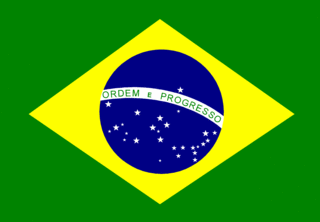
This is the Brazilian flag. The banner in the middle says “Order and Progress.” We learn in school that the green represents the forests, the yellow the gold, and the blue is obviously the sky, which features the “Southern Cross” as its most prominent constellation (oh, how I miss to see these stars in the familiar night sky under which I grew up).
Today is
Brazil’s “Independence Day” or, as it’s more commonly called there
Dia da Pátria (Day of the Homeland [more literally “Fatherland”]). I’m taking advantage of this fact and of
Sophie La Porte’s question in the
comments for the previous post, to write a bit about my home country.
It’s a sad thing to be thinking of Brasil nowadays, given the encompassing corruption scandal in which the president’s party (PT – Partido dos Trabalhadores/ Worker’s Party) is involved, but I won’t talk about the scandal, even because I don’t know, and don’t want to know much about it.
Brasil is a huge country, larger than the continental USA. It has a very diverse population, first, because of the country was inhabited by various tribes of Native Americans when it was “discovered” on 1500 by the Portuguese sailor Pedro Álvares Cabral. A second and important reason for the racial diversity is the African Diaspora, politically correct name for the atrocious practice of slavery, which took place in Brazil for almost 300 years (from the mid 1500s to 1888). Then, there were the various immigration waves, Italians, Germans, Lebanese, Japanese (Brazil is the country with the most Japanese immigrants in the world) and others.
The country was named after Brazilwood, a red wood which provided a much sought after dye which the Portuguese exported to Europe. It was a Portuguese colony until September 7, 1822 and a monarchy (with two Emperors, Dom Pedro I and Dom Pedro II) until 1889, when it became a Republic. It endured two main dictatorships, the first, “Estado Novo” (New State) 1930-1945, under Getúlio Vargas, the second, under the military, 1964-1974 (but only in 1984 a non-military president was indirectly elected). The first president elected directly by the people was impeached for corruption charges in 1992, and it might happen again with Lula, the current president.
Our country faces huge social problems. The gap between the immensely rich minority and the majority of poor, actually, miserable, people is astounding. Most people live in the large cities, close to the coast, and these large cities have millions of people living in sub-human conditions in the favelas (slums, precariously built shacks that in Rio de Janeiro cover the many steep mountains of the city, and in São Paulo, cover the valleys in between extremely rich neighborhoods, and most of the suburbs). Drug trafficking, street gangs, violence and crimes such as kidnapping are all over these big cities. Brasil is “famous” for having many street children (Sophie mentioned the film Pixote, and more recently, you can “see” the life in a favela in the movie City of God), perhaps as much as it is known for Carnival or the Amazon forest.
Well, there are many, many great things to say about Brasil, and I don’t want to get lost in my criticism (it’s easy to add a “but” to several things I’m listing next – part of being an expatriate, at least for me and my husband, involves over analyzing every single aspect of “being Brazilian”), so I’ll try to remember only the good things. First and foremost, Brazilians are a very friendly, warm people, usually very talkative, opinionated, and loud, especially because people love to hang out with friends and/or family members most of the time. People kiss and hug a lot, even perfect strangers (you always kiss when you’re introduced to someone). Brazilians are usually quite happy, and love to tell jokes and tease other people, just for fun. Brazilians can be very “relaxed” about everything, and famous for never being on time.
Brazilian popular music, particularly “classic” MPB (Música Popular Brasileira) and Bossa Nova is awesome. I just love it, and can’t say enough good things about composers/performers such as Tom Jobim, Caetano Veloso, Chico Buarque, Gilberto Gil, João Gilberto, Ivan Lins, Ellis Regina, Gal Costa, Zizi Possi, etc, etc, etc…
What do I miss the most in a day-to-day basis? The fruit. Ripe papaya every morning. The wonderful, tart, soft grapes. Fruta-do-conde. Big plump sweet purple figs. Jabuticaba. The different kinds of persimmons, both the “chocolate” version (hard), and the juicy soft bright orange kind. Mangoes of all kinds and sizes. The “exotic” fruits of the North and North-east whose pulp we buy in frozen bags in the South (where my family lives) and transform into the most wonderful juices in the world: cajá, cupuaçu, umbu, graviola, açaí!
There’s so much more… but I have to stop here. Both because I want to post this today, “Sete de Setembro” (Sept. seven), but because I need to go back to my work in the dissertation. I feel like posting tons of pictures of Brazil and links, and stuff, I know, I shouldn’t have even started!
 This is the Brazilian flag. The banner in the middle says “Order and Progress.” We learn in school that the green represents the forests, the yellow the gold, and the blue is obviously the sky, which features the “Southern Cross” as its most prominent constellation (oh, how I miss to see these stars in the familiar night sky under which I grew up).
This is the Brazilian flag. The banner in the middle says “Order and Progress.” We learn in school that the green represents the forests, the yellow the gold, and the blue is obviously the sky, which features the “Southern Cross” as its most prominent constellation (oh, how I miss to see these stars in the familiar night sky under which I grew up).





1 comment:
Oh wow, that was great! Thank you!!! And how neat that you were able to post this on Independence Day :)
I have to check out the movie City of God, it sounds very interesting. I took a class once on Brasilian Cinema, and it really sparked off my interest for the country & culture. There is ablso the possibility of dh getting sent to Brasil one day. The topic crops up now and then. I am preparing myself mentally for the possibility of this happening one day, but I have to be honest, I'm a bit scared of being an expat again in South America....
Post a Comment